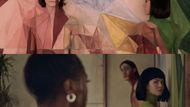Doechii released the music video for her song, Anxiety, and stirred a significant response on social media after a viral critique by Twitch streamer xQc.
The reaction reflects the growing friction between online influencer commentary and artistic expression in contemporary music.
The song, in which Doechii explores themes of vulnerability, mental health, and self-awareness, was designed to resonate with a wide demographic of listeners navigating personal struggles.
However, its reception quickly turned controversial following a public statement by xQc, a major figure in the digital entertainment ecosystem who is known for his live-streamed content and sharp, real-time critiques.
The clip of xQc reacting to the Doechii track surfaced online, sharply dividing the fan community.
While some listeners aligned with the negative sentiment, others defended the song’s message and production, asserting that the track held deeper artistic value when viewed within the context of Doechii’s larger body of work.
Doechii: Approach to experimental sound and thematic storytelling
Doechii has consistently tried to position herself as an artist who pushes the boundaries, using genre-bending production and theatrical performance to build a distinctive voice.
Anxiety is emblematic of her broader approach — layered, experimental, and deeply personal. In a TikTok video, Doechii explains:
"OK, so just a quick rundown on anxiety. Anxiety is a song that's sleepy hollow dropped, but he sampled my song and then years ago I did a remix to somebody that I used to know and I titled it Anxiety and I wrote a completely different song and now it's blowing up on TikTok and everybody is requesting it and it's out now."
The Doechii track is structured around a combination of alternative hip-hop and experimental R&B, diverging from mainstream patterns in rhythm and lyrical delivery.
Its soundscape incorporates ambient synths, offbeat percussions, and spoken-word elements, forming a sonic mirror to the chaos and introspection that often accompany mental health experiences.

Doechii’s music is said to prioritize mood and narrative cohesion over traditional chart-focused appeal. Such a creative decision, often celebrated by critics, continues to be a flashpoint when her work enters the larger sphere of internet commentary, particularly from non-musical figures with expansive platforms.
Doechii and the rise of artist–streamer clashes
The current discourse underscores a rising trend in music culture — direct intersections between musicians and content streamers. With the growing influence of streamers who regularly engage with new music during live broadcasts, reactions are immediate, unfiltered, and widely disseminated.
Doechii’s situation illustrates the complications of this dynamic. A streamer’s critique, delivered in real time to millions, can reshape the narrative around a song within hours.
An X user, @bionicleeugenic, said:
"This is not only ruining the original song but it also features lines from other popular songs and another track from another song at the end. I don't think there's anything original in that whole song, it's all stolen and duck taped together."
In this case, Anxiety quickly became a trending topic, not purely because of its musical merit or message, but due to external commentary from digital personalities.

The trend signals a shift in how music is consumed and judged. While artists like Doechii may try to create music for introspective listening or immersive storytelling, the streaming culture often tends to condense these works into short-form reactions, which may not fully encapsulate the creative intent behind a project.
Doechii: Fan discourse and the role of perception
The fanbase's response to Anxiety has seen a deep division in the online community. On one side are long-time followers of Doechii, who perceive the song as a courageous exploration of mental instability and resilience.
These listeners interpret the experimental nature of her music as part of a broader push for artistic honesty in an increasingly commercial industry.
X user @snShores humourously pointed out how people are targeting xQc as a misogynist and racist before acknowledging the song itself.
"I love how the comments would rather pretend xQc is in the KKK than actually defend the song, which is what’s actually being discussed."
Meanwhile, others wrote heartfelt gratitude for the song and dismissed xQc completely. @Misled_ETH commented:
"This is a fair assessment, however I was more so speaking to the point of OP referring to it as an unfortunate use of the original song. I would argue that Gotye would disagree with the premise of the use of his song as “unfortunate”, given the high probability of a resurgence the original should receive as an effect. To validate your point, it’s business"
Some have also made memes out of the whole situation since people who are reacting negatively genuinely don't realise that the sampled song is an original Doechii composition. According to @daemia10:
It's not the use of the original song. Original is Seville by Luiz Bonfá from 1967. Gotye pays 50% in royalties to the Bonfa estate for Somebody I Used To Know.
@NotOlyp1a said:
The people who love this song are the same people who oppose ai because it “can’t make anything original. Lol, Lmao even"
On the other side are casual listeners and viewers of streamer content, who might engage with music only through reaction formats. For this segment, a single unfavorable opinion from a popular figure can significantly color perception, even in the absence of deeper musical context.
In Doechii’s case, the song became an unexpected battleground where issues like mental health representation, artistic freedom, and the power dynamics of digital influence converged.
Doechii’s place in the broader musical landscape
Despite the controversy, Doechii remains a compelling figure in modern music. Her trajectory has been marked by an intentional embrace of unorthodoxy — balancing introspective themes with avant-garde visuals and sonic experimentation.
In an interview with Dazed, Doechii said the following on her evolving taste in style, music and life in general:
"It just depends on where I am in my life. I’ll never pinpoint myself. I’ll never lock myself down to one particular style. It’s not me. It never will be me. I find it so depressing to feel like you have to dress one way, but I also admire people who can consistently stay in a bag.”
With earlier works including Persuasive and Crazy, Doechii showcased an ability to oscillate between confident energy and emotional candor. Anxiety by Doechii continues this pattern, delving further into personal narrative, emotional unease, and psychological reflection.
Doechii has a unique voice, which often challenges conventional aesthetics and lyrical norms, has earned her recognition among genre critics and industry professionals.
While fan reactions can be unpredictable, in the case of Doechii the incident demonstrates both the volatility and power of digital platforms.
One streamer’s reaction has become a catalyst for widespread discourse, highlighting the precarious balance artists must maintain between authenticity and public interpretation.
For now, Doechii stands at the center of this conversation — not as a passive participant but as a generational artist, confronting the challenges of creation in the age of constant visibility.
